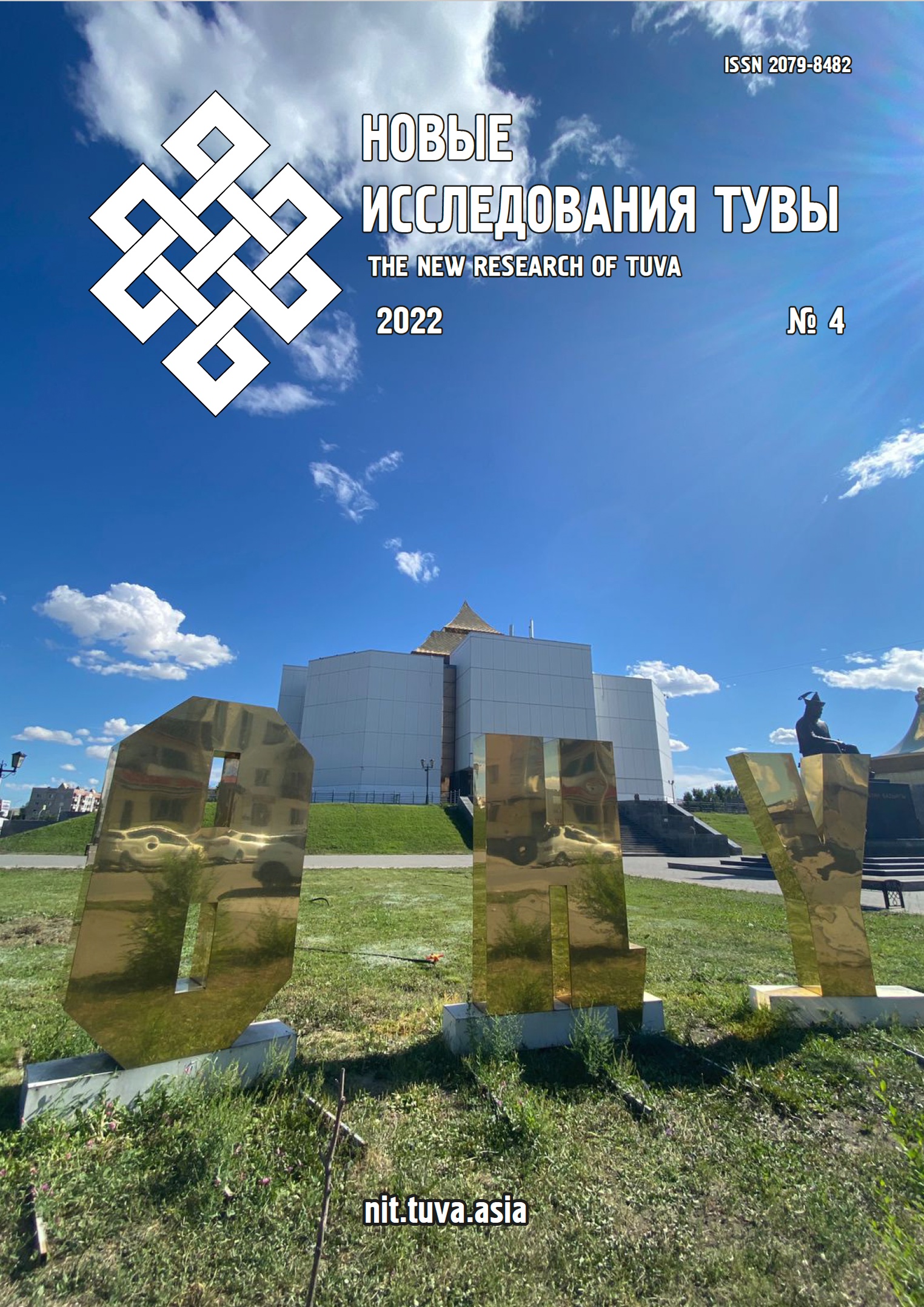Semantic zones of language perception in the context of national-Russian bilingualism in southern Siberia
DOI:
https://doi.org/10.25178/nit.2022.4.4Keywords:
contact bilingualism; languages of Southern Siberia; Russian language; English language; Tuvan language; Khakas language; Altai language; mental lexicon; psycholinguistic significance; ethnic identityAbstract
The article examines the generality and specificity of the semantic portrayal of languages of different status, including English, Russian and the second state languages of the republics of Southern Siberia (Altai, Tuvan and Khakas). We analyze the correlation of relevant encyclopedic and psycholinguistic definitions. By considering the English language in addition to the ethno-regional circle of languages one can contribute to expanding the research perspective of comparing the main rational and emotional models of the interrelation between ethnic and civil identities.
It is shown that the neutral and objective characteristics of these languages represented in the encyclopedic discourse (in correlation with the established hierarchy of vertical bilingualism) are predominantly reflected in the basic semantic zones of their psycholinguistic representation. The highest degree of commonality was identified in the dominance of the neutral zone of associative response. It makes up 80% of the entire empirical material of the study. The respondents recognize the significance of the linguistic capital of the English language on the global scale, of the Russian language as the state and dominant language in the Russian Federation and of the title (indigenous) languages as regional ones in the republics of Southern Siberia.
The binary constant of pragmatism (in relation to an unfamiliar/foreign language) and emotional positivism (in the assessment of native languages) has been revealed. The shared intersubjective meanings of perception of the titular languages of the republics of Southern Siberia include the stability of their correlation with the corresponding ethnic identity of indigenous peoples and historical territories of their residence. A positive evaluation of the uniqueness and beauty of native languages prevails in the associative strategies of the respondents of the titular ethnic groups. The negative aspect of their perception, which is characteristic mainly for Russian respondents, is associated with ideas about the low symbolic significance of minority languages on the linguistic capital market and ethnic heterostereotypes.
References
Abdulatipov, R. G. (2005) Rossiiskaia natsiia (etnonatsional'naia i grazhdanskaia identichnost' rossiian v sovremennykh usloviiakh) [Russian nation (ethno-national and civil identity of Russians in modern conditions]. Moscow, Nauchnaia kniga. 472 p. (In Russ.).
Arefiev A. L., Bakhtikireeva U. M. and Sinyachkin V. P. (2021) Problemy bilingvizma v sisteme shkol'nogo iazykovogo obrazovaniia Respubliki Tyva [Bilingualism in language education in secondary schools of the Republic of Tuva]. New Research of Tuva, no. 1, pp. 255–272. (In Russ.). DOI: https://doi.org/10.25178/nit.2021.1.14
Bogdanov, S. I., Marusenko, M. A. and Marusenko, N. M. (2020) Iazykovoi kapital v kul'turnom i obrazovatel'nom kapitale [Language capital in cultural and educational capital]. Sociolinguistics, no. 2 (2), pp. 8–20. (In Russ.). DOI: https://doi.org/10.37892/2713-2951-2020-2-2-8-20
Borgoiakova, T. G. (2002) Sotsiolingvisticheskie protsessy v respublikakh Iuzhnoi Sibiri [Sociolinguistic processes in the republics of southern Siberia]. Abakan, Publishing House of Katanov State University of Khakassia. 166 p. (In Russ.).
Borgoiakova, T. G. (2014) Problemy iazykovoi globalizatsii v regional'nom aspekte [Problems of linguistic globalization in the regional aspect]. Vestnik Khakasskogo gosudarstvennogo universiteta imeni N. F. Katanova, no. 7, pp. 22–25. (In Russ.).
Borgoiakova, T. G. and Bitkeeva, A. N. (2020) Tuvinskii iazyk v pravovom i funktsional'nom izmerenii [Tuvan language in legal and functional aspect]. New Research of Tuva, no. 1, pp. 50–61. (In Russ.). DOI: https://doi.org/10.25178/nit.2020.1.4
Borgoiakova, T. G. and Guseinova, A. V. (2017) Status i funktsionirovanie tiurkskikh iazykov Iuzhnoi Sibiri [Status and functioning of the Turkic languages of southern Siberia]. Abakan, Publishing House of Katanov State University of Khakassia. 136 p. (In Russ.).
Drobizheva, L. M. (2006) Gosudarstvennaia i etnicheskaia identichnost': vybor i podvizhnost' [State and ethnic identity: Choice and mobility]. In: Grazhdanskie, etnicheskie i religioznye identichnosti v sovremennoi Rossii [Civil, ethnic and religious identities in modern Russia] / ed. by V. S. Magun. Moscow, Publishing House of the Institute of Sociology of the Russian Academy of Sciences. 327 p. Pp. 10–29. (In Russ.).
Zalevskaya, A. A. (2014) Metodologiia, tekhnologiia i terminologiia: o neodnoznachnosti nauchnykh terminov [Methodology, technology and terminology: To the homonymy of scientific terms]. Voprosy psikholingvistiki, no. 20, pp. 12–27. (In Russ.).
Kibrik, A. A. (2020) Sokhranenie iazykovogo raznoobraziia Rossii: kontury programmy [Preservation of linguistic diversity in Russia: Contours of the program]. Sociolinguistics, no. 1, pp. 17–28. (In Russ.). DOI: https://doi.org/10.37892/2713-2951-2020-1-1-17-28
Lamazhaa, Ch. K. (2016) Tuvinskaia etnichnost' i sotsium v etnosotsiologicheskikh i antropologicheskikh issledovaniiakh [Tuvan ethnicity and the society in ethnosociological and anthropological studies]. The New Research of Tuva, no. 2, pp. 32–51. (In Russ.).
Lamazhaa, Ch. K. (2021) Tuva kak limitrofnaia zona: iazyk, religiia i identifikatsiia tuvintsev [Tuva as a limitrophe zone: Language, religion and identification of Tuvans]. New Research of Tuva, n. 3, pp. 178–194. (In Russ.). DOI: https://doi.org/10.25178/nit.2021.3.14
Smirnova, N. M. (2014) Kontsept intersub"ektivnosti v strukturakh mezhdistsiplinarnogo sinteza [The concept of intersubjectivity in the framework of interdisciplinary synthesis]. In: Filosofiia nauki. Epistemologiia v mezhdistsiplinarnykh issledovaniiakh [Philosophy of science. Epistemology in interdisciplinary research] / ed. by I. A. Gerasimova. Moscow, Institute of Philosophy RAS. Issue 19. 302 p. Pp. 145–163. (In Russ.).
Borgoiakova, T. G. and Guseinova, A. V. (2021) Contextualized bilingualism in the republics of southern Siberia. Journal of Siberian Federal University. Humanities & Social Sciences, no. 14 (4), pp. 466–477. DOI: https://doi.org/10.17516/1997-1370-0734
Published
How to Cite
For citation:
Borgoiakova T. G. and Pokoiakova K. A. Smyslovye zony vospriiatiia iazykov v kontekste natsional’no-russkogo bilingvizma Iuzhnoi Sibiri [Semantic zones of language perception in the context of national-Russian bilingualism in Southern Siberia]. New Research of Tuva, 2022, no. 4, pp. 53-64 (In Russ.). DOI: https://doi.org/10.25178/nit.2022.4.4
Issue
Section

This work is licensed under a Creative Commons Attribution-NonCommercial 4.0 International License.

Author(s) license holder(s) grant rights for their work to the journal (grantee of a license) under the simple non-exclusive open license in accordance with Art. 1286.1 «Open license for a research work, work of literature or fine arts», Civil Code of the Russian Federation.
New Research of Tuva publishes articles under the Creative Commons Attribution-NonCommercial license (CC BY-NC).
Since it is an open license, author(s) reserve the right to upload the article to their institutional repository, submit it to another journal (if it allows republications), or republish it on their own website (in full, or in part).
However, several conditions apply here:
a) The republished version must always contain the name(s) and affiliation(s) of the author(s), the original title and the hyperlink to the original version on the New Research of Tuva website;
b) It must be in open access, free of charge, and no category of readers must be in any way whatsoever advantaged over general readership.
c) should the contribution be submitted elsewhere by its author(s) without substantial modification (30% or more of original text unchanged), the body of the article should contain a disclaimer that the original version was published in New Research of Tuva (with a link to the respective page)
The CC-BY-NC is a non-revocable license which applies worldwide and lasts for the duration of the work’s copyright.










